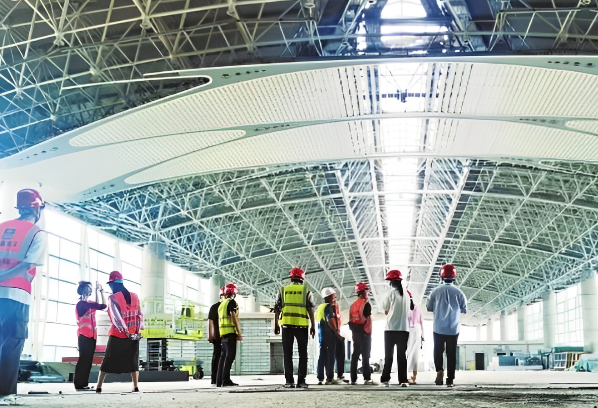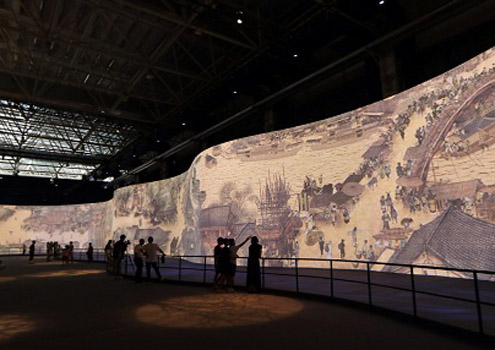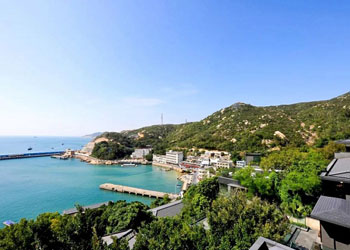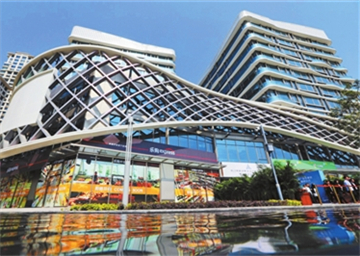Zhuhai lays out overall plan for transportation upgrade
Zhuhai will form a "1312" transportation circle, according to the Overall Plan for Zhuhai's Comprehensive Transportation (2021-35) (draft), which was released by the Zhuhai Natural Resources Bureau on April 26 to solicit public opinions.
The "1312" transportation circle refers to a transportation model that allows people to reach cities in the Guangdong-Hong Kong-Macao Greater Bay Area within one hour, other cities in Guangdong and major domestic cities within three hours, and major global cities in 12 hours.

Construction site of Zhuhai (Jinwan) Airport's Terminal II [Photo by Zhang Zhou and Zhong Fan / Zhuhai Daily]
The plan features 95 measures throughout 12 chapters, and highlights Zhuhai's core target of becoming a national comprehensive transportation hub city, transportation core city along the west bank of the Pearl River Estuary, and demonstrative city for green and "smart" transportation.
Efforts will be made to further develop the city's aviation hub, ports and shipping system, railways, highways, checkpoints, and comprehensive transportation hubs. Zhuhai (Jinwan) Airport will be built into a comprehensive regional hub airport. It is also planned to become an international aviation gateway hub and aviation logistics center along the west bank of the Pearl River Estuary.
As of 2035, the airport will be able to handle an annual passenger throughput of 43 million, and a cargo throughput of 210,000 metric tons.
Zhuhai Port has been designed to be a major coastal feeder port for containers in the Greater Bay Area. It will be a major international port logistics center in South China, leading port for advanced equipment manufacturing along the west bank of the Pearl River Estuary, and an export gateway for the Xijiang River Basin. The port will handle 310 million tons of cargo and 2 million 20-foot equivalent units (TEU) containers by 2035.
Four high-speed railways have been planned, namely the Zhuhai-Yangjiang, Shenzhen-Zhuhai, Zhuhai-Zhaoqing, and Guangzhou-Zhuhai (Macao) high-speed railways. As of 2035, passengers will be able to reach major domestic cities within eight hours from Zhuhai, and it will only take one hour to arrive in cities within the Greater Bay Area. A 30-minute transportation circle will also be formed in the Zhuhai-Zhongshan-Jiangmen city cluster.
By 2035, public transportation will account for 60 percent of motor vehicle travels within Zhuhai. Additionally, the public transportation rate in Zhuhai's downtown areas will reach 70 percent.
The city will have 3.09 million buses as of 2035 and around 280 to 330 bus routes. The average speed of buses on major routes in core downtown areas will reach 22 kilometers per hour (14 mph) and the average number of buses per 10,000 people will be 22.
Seven urban rail transit lines that stretch 421 kilometers (262 miles) have been laid out, promoting the integrated development of east and west wings of Zhuhai.
Zhuhai has planned to build a three-tier logistics system that features logistics parks, logistics centers, and distribution centers. The three constituent parts will be upgraded to logistics commercial areas, logistics parks, and joint distribution centers in the future.
In addition, three logistics commercial areas will be built around the Hong Kong-Zhuhai-Macao Bridge, Zhuhai (Jinwan) Airport, and Gaolan Port.
Four logistics parks will be built to support industrial development in major areas and islands. Among them, the Fushan Logistics Park will cover a total area of 180 hectares (445 acres), and the Doumen Port Logistics Park will cover 120 hectares (297 acres).
Ten joint distribution centers will be constructed according to urban land use plan, which will improve urban living quality. Their total area will be around 245 hectares (605 acres).



